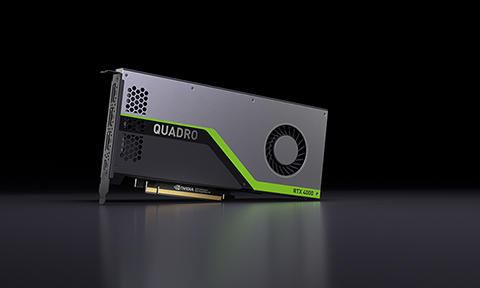
Nvidia has introduced the Quadro RTX 4000, a new single slot, ‘VR Ready’ mid-range professional GPU powered by the Nvidia Turing architecture and the Nvidia RTX platform.
Like the high-end Quadro RTX 5000, 6000 and 8000 announced earlier this year, the RTX 4000 is heavily focused on ray trace rendering.
It features dedicated Ray Tracing (RT) Cores and next-gen Tensor Cores for Artificial Intelligence (AI) inferencing.
The RT cores trace the rays of light as they pass through a scene, reflecting off and refracting through objects, while the Tensor cores are used for AI-based de-noising, which Nvidia CEO Jensen Huang describes as ‘filling in all the spots that the rays haven’t reached yet’ and is essentially a short cut to full ray tracing.
With Quadro RTX, Nvidia says designers can iterate a product model or building and see accurate lighting, shadows and reflections in real time.
We imagine ‘real time’ in the true sense will be left to one or more high Quadro RTX 6000 or 8000s GPUs while the Quadro RTX 4000 will just do it quickly, but this will obviously depend on the complexity of the scene and the display resolution.
Nvidia compares the Quadro RTX 4000 to the previous generation Quadro P4000 and says there are significant performance improvements. It has 8GB of GDDR6 memory, delivering over 40 percent more memory bandwidth than the P4000 which has 8GB of GDDR5 memory.
It delivers 7.1 TFLOPS of FP32 performance compared to the P4000’s 5.3 TFLOPS but its max power consumption is also considerably higher – 160W compared to 105W.
In terms of specifications that are unique to the RTX family, it features 36 RT Cores for real-time ray tracing of objects and environments with physically accurate shadows, reflections, refractions and global illumination and 288 Turing Tensor Cores for 57 TFLOPS of deep learning performance.
In comparison, the high-end Quadro RTX 5000 has 48 RT cores and 384 Tensor Cores and the ultra-high-end Quadro RTX 6000 and 8000 have 72 RT cores and 576 Tensor Cores.
Commercial software that supports Nvidia RTX is not yet available, but global architectural firm CannonDesign has early access to the technology. Ernesto Pacheco, director of visualisation at the company, talks about his experience: “Our designers need tools that unleash their creative freedom to design amazing buildings. Real-time rendering with the new Quadro RTX 4000 is unbelievably fast and smooth right out of the gate – no latency and the quality and accuracy of the lighting is outstanding.
“It will enable us to accelerate our workflow and let our designers focus on the design process without the technology slowing them down.”
The Quadro RTX 4000 also includes hardware support for VirtualLink, a new open industry standard that is designed to meet the power, display and bandwidth demands of next-generation VR headsets through a single USB-C connector.
The GPU will be available in December on nvidia.com and from leading workstation manufacturers, including Dell, HP and Lenovo, and authorised distribution partners, including PNY Technologies Europe. The estimated street price is $900.






